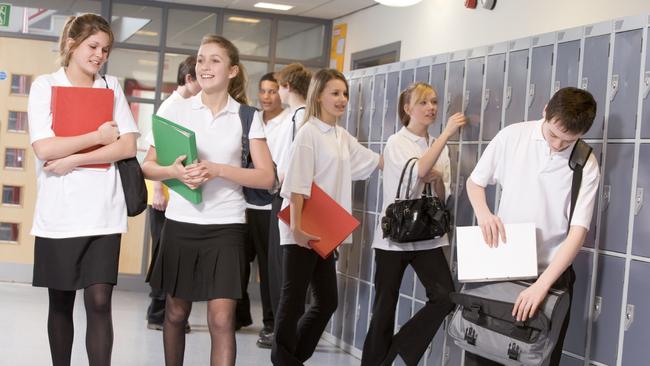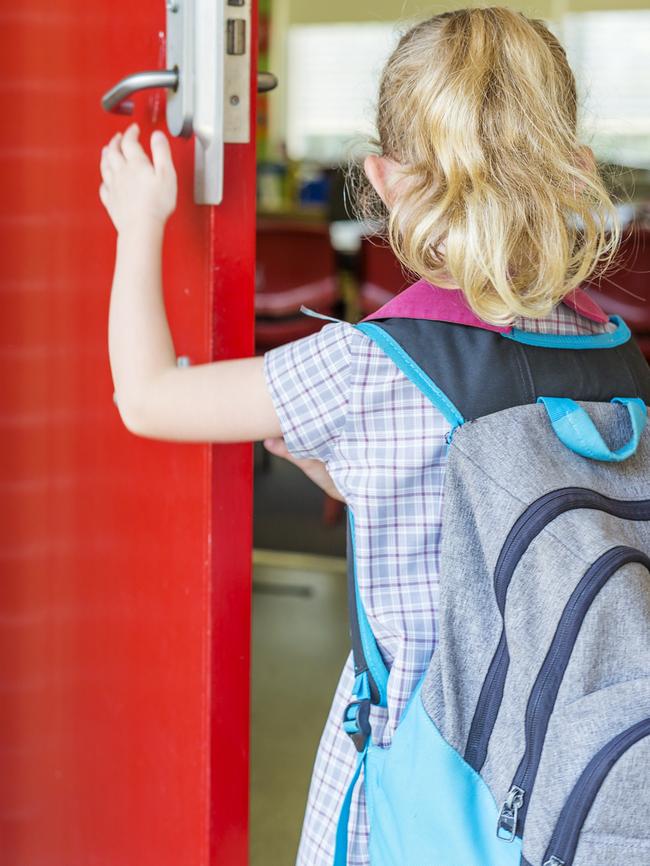Back to school: How being late to school can affect your child’s future
Losing track of time and being late to school can be detrimental to your child’s future. See why and tips to help them make friends.

SmartDaily
Don't miss out on the headlines from SmartDaily. Followed categories will be added to My News.
Regular tardiness can have dire long-term repercussions for school kids, with parents being urged to teach them good time management skills early on.
Time management expert Kate Christie says being chronically late to class could set children up for a lifetime of lateness, and reminds parents “the younger we can set up good habits the better”.
“It’s really important to instil those great time-management habits in our kids as early as possible … it will help them immensely through secondary school and onwards,” she said.
Learning how to plan ahead and follow a schedule is not something often taught at school, meaning the important job often lands on the shoulders of parents.
“In terms of long-term great habits, it’s just going to make their life easier in terms of their career as it’s a very transferable skill beneficial in every field,” Christie says.
“Managing your time is a soft skill that will see you be quite successful in the workplace as it’s not something we are often taught how to manage.”

Christie says it’s important to keep in mind that losing track of time can have negative impacts socially. “There’s an element of respect about it in terms of respecting your teachers and classmates, it can be really disruptive for others if someone is often late,” she says.
“It comes down to a lack of discipline, or a lack of habit … I don’t think too many people openly disrespect each other in that sense, it’s just a lack of awareness as to how it impacts others.”
Melbourne mum of two Linda Mitchell strives to get her daughters to school early whenever possible.
“From what I’ve seen it helps with their routine, social interactions before school and help set the pace for the day,” Mitchell says. “I know that later in life punctuality is really important, both in the workplace and socially, and I want my girls to establish these good habits early on. But it does get hard juggling everything sometimes.”
While parents should strive for punctuality, Christie admits it is impossible to always maintain perfect routines. “I’ve had young kids, I recognise it’s not always that way, life’s hard,” Christie says.
“You’re not ruining their lives if they’re late every now and then; cut yourself some slack, life is a constant juggle. Remember – habits are very hard to form but even harder to break.”
HOW TO MAKE FRIENDS ON THE FIRST DAY OF SCHOOL
The first day at school without a bestie by your side, whether it’s in prep or high school, can be distressing for any student but there are ways to help your child quickly make friends.
Psychologist and headspace app mental health expert Carly Dober says with the right words of encouragement and some helpful tools, “parents can set children up to have a positive day”.
“Where they might feel sad, embarrassed, or alone, think of how to encourage them and remind them of their strengths. Remind them they’re a lovely friend, a great listener and have made friends before so they will again even if it may not happen immediately.
“Coach them through ideas of how to approach people such as finding common interests. You can’t assume kids know how to approach. They might need a confidence boost.”
Dober says using established social approaches — looking people in the eye when you speak, saying hello and exchanging names and asking questions about the things you like or talking about yourself can all be ice breakers.

She says good childhood friendships aren’t just helpful to build self-esteem but set a lifetime of good adult relationships as well.
“It’s incredibly important for children to have friends, for numerous reasons,” Dober says.
“Research shows that childhood friendships help children learn about themselves and develop a positive sense of self. It’s also important for ongoing development of their social skills, initiating interaction, taking turns, sharing, celebrating, and resolving conflict.’’
SENSE OF SELF
Clinical psychologist with expertise in working with children and adolescents Dr Simon Crisp says there’s not just one right way to have friends and parents of young adolescents should appreciate it’s a critical time for emotional and psychological development through peers.
“It can be a period of great stress for young people where they’re identifying with peers anddeveloping their identity based on the peer group,” Crisp says.
“It’s important for parents and educators to seek out and celebrate what is special about each
unique young person. What are their strength? This sets the foundation to build relationships on.”

While there isn’t a perfect formula to what makes a friendship, a clear identity is central to who you are as an individual and will shape your friendships.
“The age of 13-14 is a common time where one’s sense of self is clearer but is different to the dominant, cool group,” he says.
“This can cause a crisis, struggling to find your tribe, so it’s important for young people not to expect a perfect fit with their group.”
For those starting a new secondary school, common interests are an obvious connection to build upon.
“It’s important in the first weeks and months, particularly in year 7, to be mobile – find out who is around and don’t just grab hold of the first person you find, to become your friend,” he says.
“Survey the territory. It’s good for parents to encourage kids to keep meeting other people and keeping the options open.”
KINDRID SPIRITS
Entertainer Matt Hetherington says his children Oscar, 10, and Madeline, 8, have always been able to extend themselves to other children perhaps aided by living in the US for six years, returning in 2020.
He’s been proud to observe Oscar in particular approach new kids at school or in his football and cricket clubs.
“He’s a sensitive soul but they both naturally find their kindred spirits,” Hetherington says.
Oscar says it took him a couple of weeks to make new friends when he returned to school in Australia three years ago.


“It took three months to make my best friend,” Oscar says.
“In Grade 2 we started with Pokemon, then we started play dates and realised we had a lot in common and became good friends. I’m also friends with his friend group and I still have a few of my own friends in the US.”
Madeleine, about to start Grade 3, has had a best friend throughout primary school.
“We like to have sleep overs, we call each other sisters and we basically are,” Madeleine says.
“We’re not going to be in the same class this year and we were crying about that but it’s funny that there are two classrooms with a door dividing them and my best friend will be in the class next door to me.’’
DOES IT MATTER IF MY CHILD IS LATE?
Regular tardiness can have dire long-term repercussions for school kids, with parents being urged to teach them good time management skills early on.
Time management expert Kate Christie says being chronically late to class could set children up for a lifetime of lateness, and reminds parents “the younger we can set up good habits the better”.
“It’s really important to instil those great time-management habits in our kids as early as possible … it will help them immensely through secondary school and onwards,” she said.

Learning how to plan ahead and follow a schedule is not something often taught at school, meaning the important job often lands on the shoulders of parents.
“In terms of long-term great habits, it’s just going to make their life easier in terms of their career as it’s a very transferable skill beneficial in every field,” Christie says. “Managing your time is a soft skill that will see you be quite successful in the workplace as it’s not something we are often taught how to manage.”
Christie says it’s important to keep in mind that losing track of time can have negative impacts socially. “There’s an element of respect about it in terms of respecting your teachers and classmates, it can be really disruptive for others if someone is often late,” she says.
“It comes down to a lack of discipline, or a lack of habit … I don’t think too many people openly disrespect each other in that sense, it’s just a lack of awareness as to how it impacts others.”
Melbourne mum of two Linda Mitchell strives to get her daughters to school early whenever possible.
“From what I’ve seen it helps with their routine, social interactions before school and help set the pace for the day,” Mitchell says. “I know that later in life punctuality is really important, both in the workplace and socially, and I want my girls to establish these good habits early on. But it does get hard juggling everything sometimes.”
While parents should strive for punctuality, Christie admits it is impossible to always maintain perfect routines. “I’ve had young kids, I recognise it’s not always that way, life’s hard,” Christie says.
“You’re not ruining their lives if they’re late every now and then; cut yourself some slack, life is a constant juggle. Remember – habits are very hard to form but even harder to break.”
More Coverage
Originally published as Back to school: How being late to school can affect your child’s future




